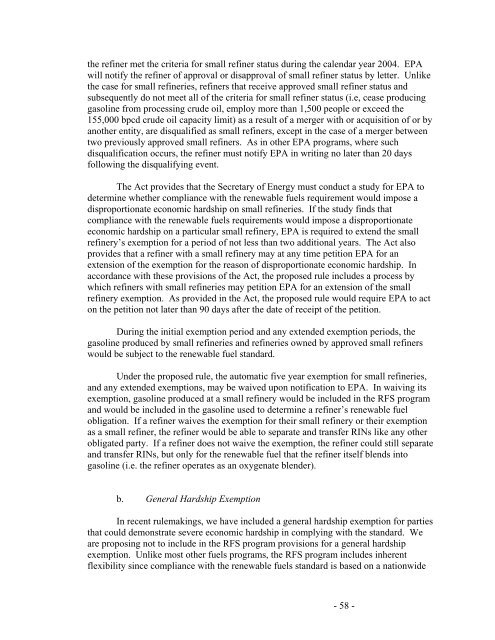Regulation of Fuels and Fuel Additives: Renewable Fuel Standard ...
Regulation of Fuels and Fuel Additives: Renewable Fuel Standard ...
Regulation of Fuels and Fuel Additives: Renewable Fuel Standard ...
Create successful ePaper yourself
Turn your PDF publications into a flip-book with our unique Google optimized e-Paper software.
the refiner met the criteria for small refiner status during the calendar year 2004. EPA<br />
will notify the refiner <strong>of</strong> approval or disapproval <strong>of</strong> small refiner status by letter. Unlike<br />
the case for small refineries, refiners that receive approved small refiner status <strong>and</strong><br />
subsequently do not meet all <strong>of</strong> the criteria for small refiner status (i.e, cease producing<br />
gasoline from processing crude oil, employ more than 1,500 people or exceed the<br />
155,000 bpcd crude oil capacity limit) as a result <strong>of</strong> a merger with or acquisition <strong>of</strong> or by<br />
another entity, are disqualified as small refiners, except in the case <strong>of</strong> a merger between<br />
two previously approved small refiners. As in other EPA programs, where such<br />
disqualification occurs, the refiner must notify EPA in writing no later than 20 days<br />
following the disqualifying event.<br />
The Act provides that the Secretary <strong>of</strong> Energy must conduct a study for EPA to<br />
determine whether compliance with the renewable fuels requirement would impose a<br />
disproportionate economic hardship on small refineries. If the study finds that<br />
compliance with the renewable fuels requirements would impose a disproportionate<br />
economic hardship on a particular small refinery, EPA is required to extend the small<br />
refinery’s exemption for a period <strong>of</strong> not less than two additional years. The Act also<br />
provides that a refiner with a small refinery may at any time petition EPA for an<br />
extension <strong>of</strong> the exemption for the reason <strong>of</strong> disproportionate economic hardship. In<br />
accordance with these provisions <strong>of</strong> the Act, the proposed rule includes a process by<br />
which refiners with small refineries may petition EPA for an extension <strong>of</strong> the small<br />
refinery exemption. As provided in the Act, the proposed rule would require EPA to act<br />
on the petition not later than 90 days after the date <strong>of</strong> receipt <strong>of</strong> the petition.<br />
During the initial exemption period <strong>and</strong> any extended exemption periods, the<br />
gasoline produced by small refineries <strong>and</strong> refineries owned by approved small refiners<br />
would be subject to the renewable fuel st<strong>and</strong>ard.<br />
Under the proposed rule, the automatic five year exemption for small refineries,<br />
<strong>and</strong> any extended exemptions, may be waived upon notification to EPA. In waiving its<br />
exemption, gasoline produced at a small refinery would be included in the RFS program<br />
<strong>and</strong> would be included in the gasoline used to determine a refiner’s renewable fuel<br />
obligation. If a refiner waives the exemption for their small refinery or their exemption<br />
as a small refiner, the refiner would be able to separate <strong>and</strong> transfer RINs like any other<br />
obligated party. If a refiner does not waive the exemption, the refiner could still separate<br />
<strong>and</strong> transfer RINs, but only for the renewable fuel that the refiner itself blends into<br />
gasoline (i.e. the refiner operates as an oxygenate blender).<br />
b. General Hardship Exemption<br />
In recent rulemakings, we have included a general hardship exemption for parties<br />
that could demonstrate severe economic hardship in complying with the st<strong>and</strong>ard. We<br />
are proposing not to include in the RFS program provisions for a general hardship<br />
exemption. Unlike most other fuels programs, the RFS program includes inherent<br />
flexibility since compliance with the renewable fuels st<strong>and</strong>ard is based on a nationwide<br />
- 58 -
















